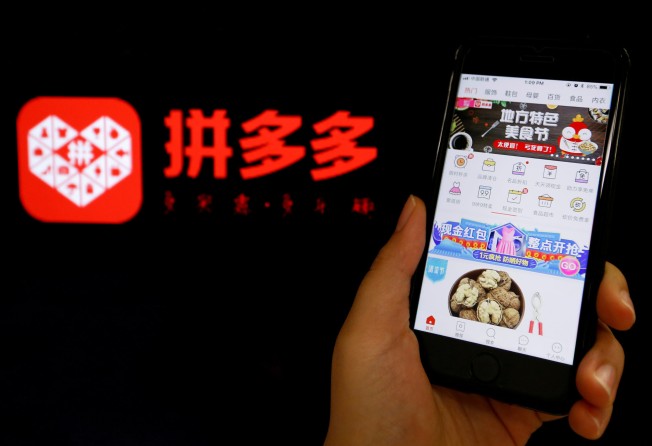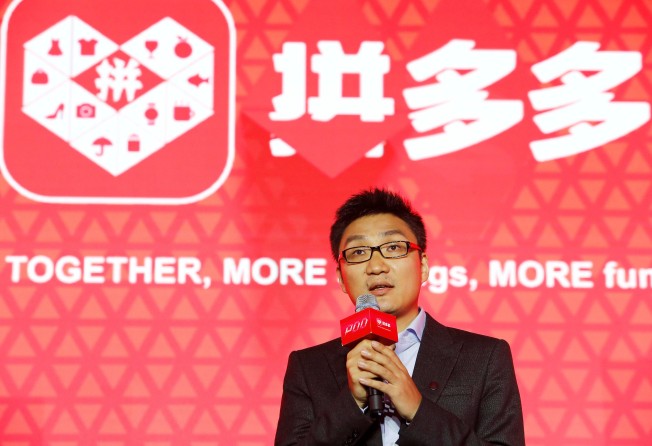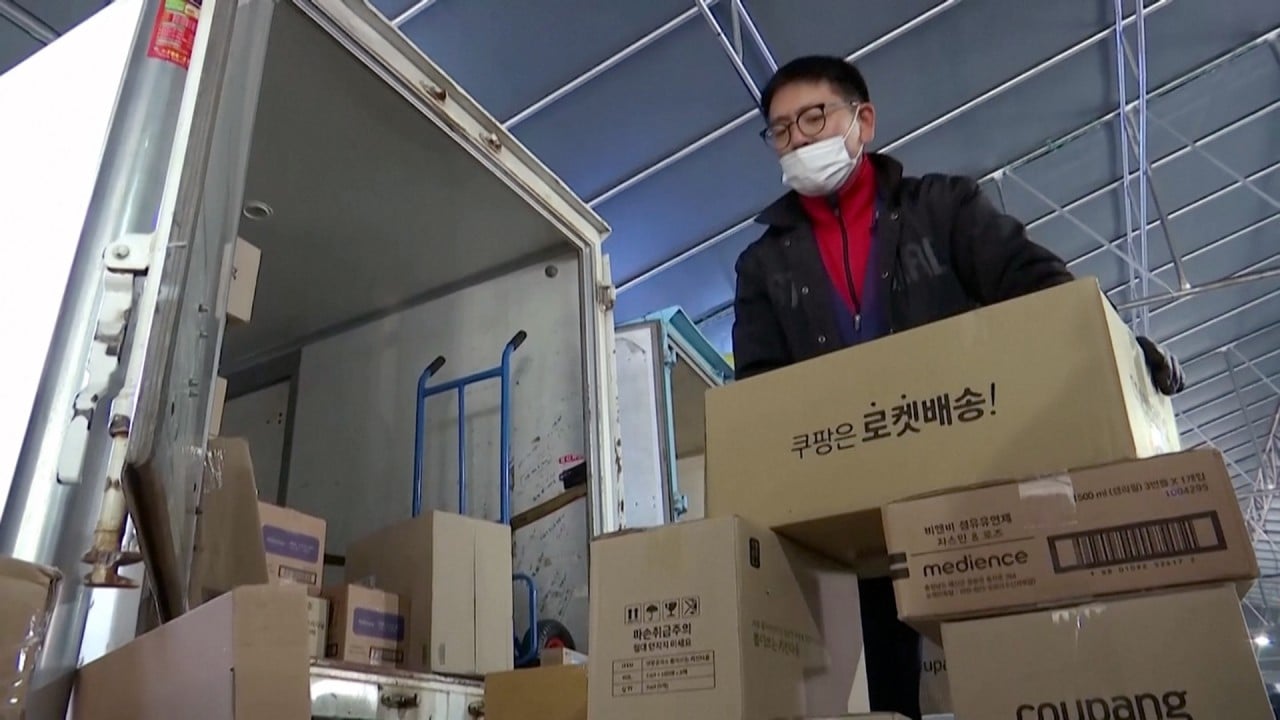
Colin Huang takes another step back from Pinduoduo just when things are starting to take off
- Colin Huang’s new focus on scientific research aligns with Beijing’s political priorities, but it comes at a time of regulatory uncertainty for Big Tech
- Huang is joining an area critical to Pinduoduo’s continued success, as the company helps develop China’s rural economy

When Pinduoduo founder Colin Huang Zheng, 41, announced he was stepping down as chairman of the company he built into China’s most widely used e-commerce platform in just six years, it came as a shock to many. But the entrepreneur’s move into a new position in food and life sciences comes amid a regulatory crackdown on Big Tech even as Beijing pours more resources into research and development.
Huang is part of a new generation of young Chinese billionaires who built their fortune during the rise of China’s internet economy over the past decade. The former Google engineer started his fourth venture, Pinhaohuo, at age 35 in 2015, when his focus was on gamifying e-commerce and selling low-end products. On Wednesday, Pinduoduo unveiled that it surpassed rivals Alibaba Group Holding and JD.com in annual active buyers in China last year.
By the numbers, Pinduoduo has never looked stronger. Huang’s announcement came at the same time as Pinduoduo’s fourth-quarter earnings, which showed revenues up 146 per cent year on year. But the company has also been mired in controversy following criticisms of its demanding work culture last year and Beijing’s increasing scrutiny of disruptive business models from tech companies.
“Pinduoduo is already on the right track of steady development,” said Zhang Xiaorong, director of the think tank Beijing Cutting-Edge Technology Research Institute.
Huang’s departure is not likely to significantly impact company operations, according to Zhang, but it could change public perception, as happened with Apple after the death of its founder and CEO Steve Jobs. “The departure of the founder of a company can often lead to the public’s concerns about the company’s lack of motivation to innovate and expand in the future,” he said.
Pinduoduo did not respond to a request for comment.
The founder already ceded the position of CEO last July to long-time collaborator Chen Lei, who is now taking over as chairman. Huang is also known for his interests outside business, and he expressed interest in changing gears to food science, noting Pinduoduo’s commitment to agriculture.
“Although Pinduoduo is still a young company with a long runway for growth, it is about the right time to explore what’s next if we want the same quality and pace of growth in 10 years,” Huang wrote in a letter to shareholders. “As the founder of this company, I am probably the most suitable person to take on this task by stepping out of the business and the comfort zone to embark on a journey of exploration.”
As a former engineer who was inspired by inventor and US founding father Benjamin Franklin, Huang said the decision to explore science is aligned with his personal interests. He also expressed interest in becoming a scientific research assistant in his letter and donated $100 million to Zhejiang University on Thursday to support basic research in biomedical science, agriculture and food.
Basic research, which develops and improves scientific theories rather than practical applications, is a new focus for Beijing, which introduced new incentives in this area and related tax reforms at its recently concluded “two sessions” event.
Huang’s new focus also aligns with Pinduoduo’s long-term strategy – the company sold 270 billion yuan (US$41.5 billion) worth of rural produce last year and invests heavily in agricultural technology (agritech) and rural infrastructure, another priority for Beijing.
While closely following political trends, Huang’s new mission is also in an area of critical importance to his company’s future growth, according to Cao Lei, director of the E-Commerce Research Centre. Pinduoduo’s current model is more suitable for past conditions in China, Cao said, but e-commerce competition is becoming more intense.
“Companies have to look for more refined and fundamental methods of driving growth, and Pinduoduo’s approach of using new technological momentum such as agritech and food science to drive future growth is the right answer,” Cao said.

However, Huang’s move also comes just months after debate was reignited about the company’s working conditions. In December, a 22-year-old female employee died after she collapsed while walking home after midnight. This sparked nationwide criticism and spurred a renewed conversation about tech companies’ notorious “996” overwork culture, which refers to an unofficial policy of having employees work nine 9am to 9pm, six days a week.
Two weeks later, a former employee of Pinduoduo said he was terminated because of a post he made on anonymous professional social network Maimai about a colleague being hospitalised. A video he posted detailing working conditions at the social e-commerce giant went viral.
These incidents caused a public relations storm for the company early this year, culminating with the loss of an exclusive partnership with state broadcaster China Central Television for the Spring Festival Gala, the world’s most-watched television programme and a promotional battleground for China’s largest internet companies.
The recent backlash added to Pinduoduo’s already complicated public image. The company has been criticised in the past over product quality, having grown largely by focusing on price-sensitive consumers in lower-tier cities, where it offered inferior products at rock-bottom prices. Since its initial public offering in July 2018, the company has also been plagued by negative press reports about counterfeit and imitation products on the platform.
Amid China’s ongoing antitrust crackdown and tightening regulations for “platform economy” companies, Pinduoduo is now in regulators’ crosshairs.
In early March, China’s market regulator penalised community group buying units under Pinduoduo, ride-hailing firm Didi Chuxing, online delivery company Meituan, and Nice Tuan, a start-up backed by Alibaba, which owns the South China Morning Post. They were found to have violated China’s Price Law by slashing prices to edge out competitors and each fined 1.5 million yuan.
Even as Huang shifts gears to focus on his company’s agritech future, though, relinquishing the chairmanship does not mean giving up his influence. He is still Pinduoduo’s biggest shareholder, owning 29.4 per cent of the company, although the 1-to-10 voting rights on his shares will be removed. Huang said he will not sell his shares for at least another three years.
“He can come back at any time if he wants,” said Chen Tao, an analyst with research firm Analysys.
“Anti-monopoly regulations or scandals around the company are just small influencing factors compared to such a major decision to resign,” Chen said. “I think it should be a long-contemplated decision considering the company’s overall development plan, or really his personal choice, as he said in the letter.”
